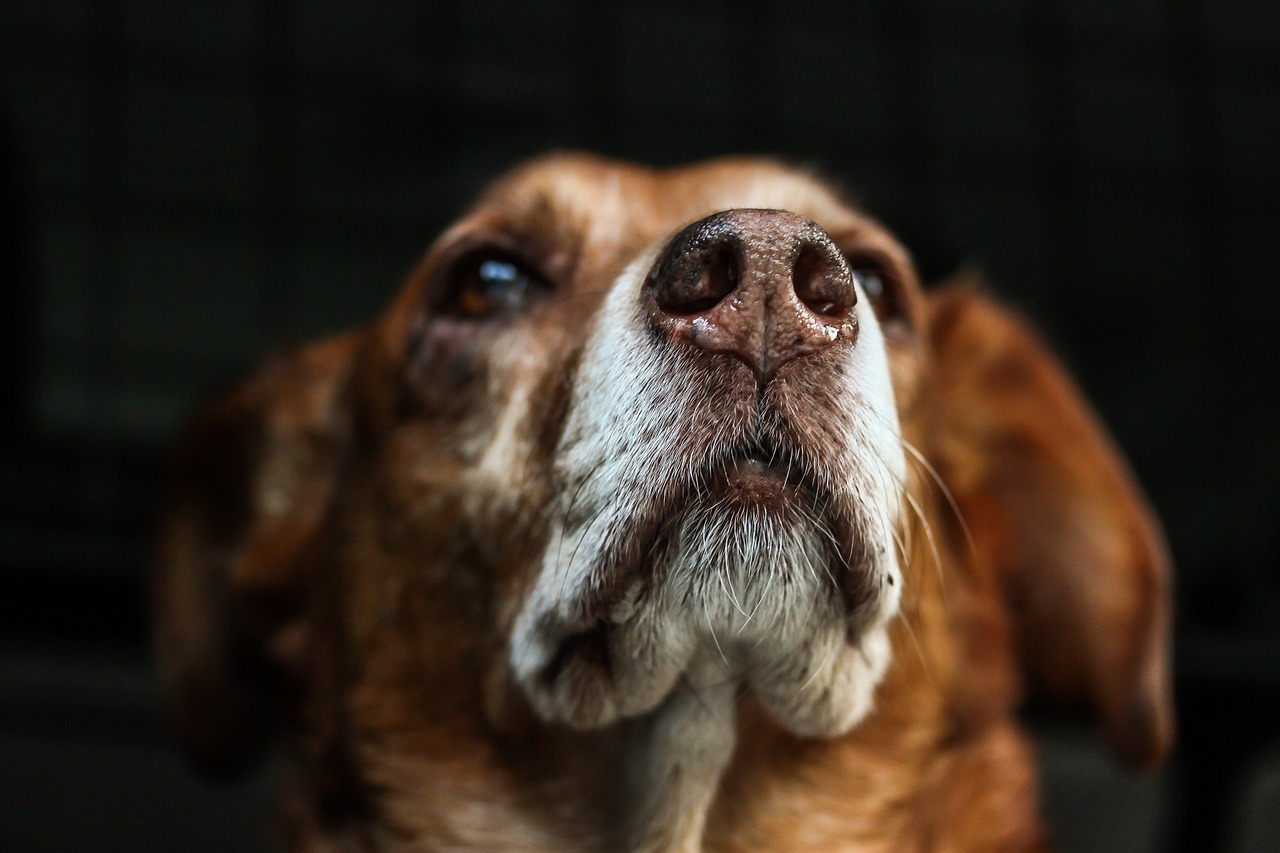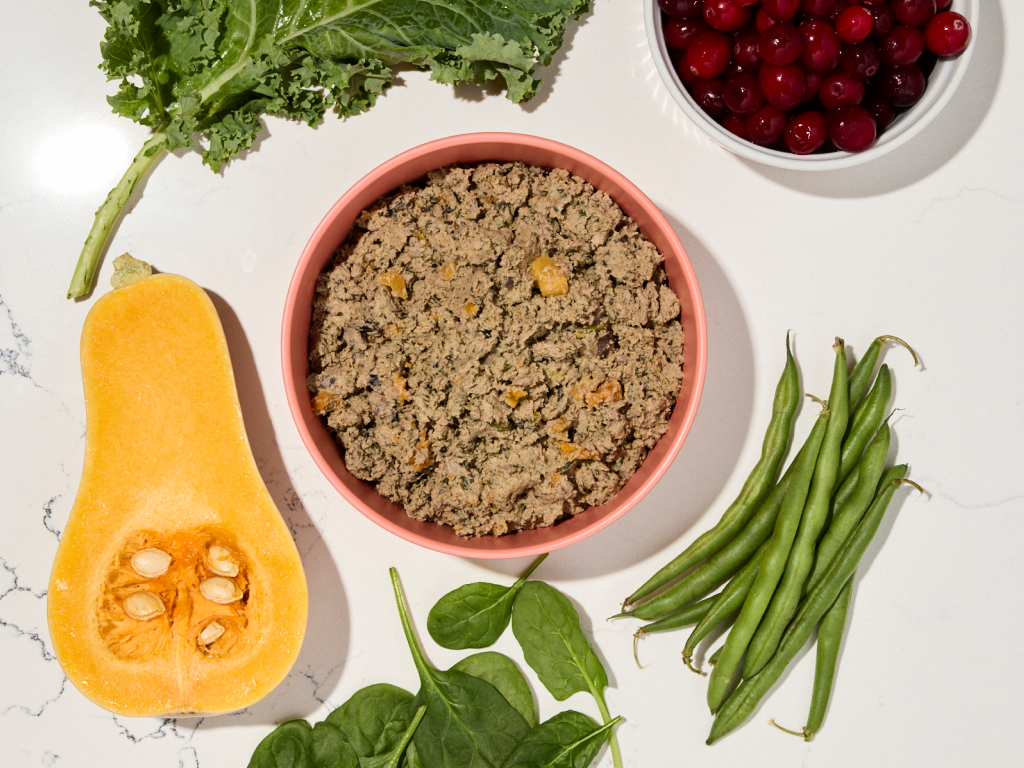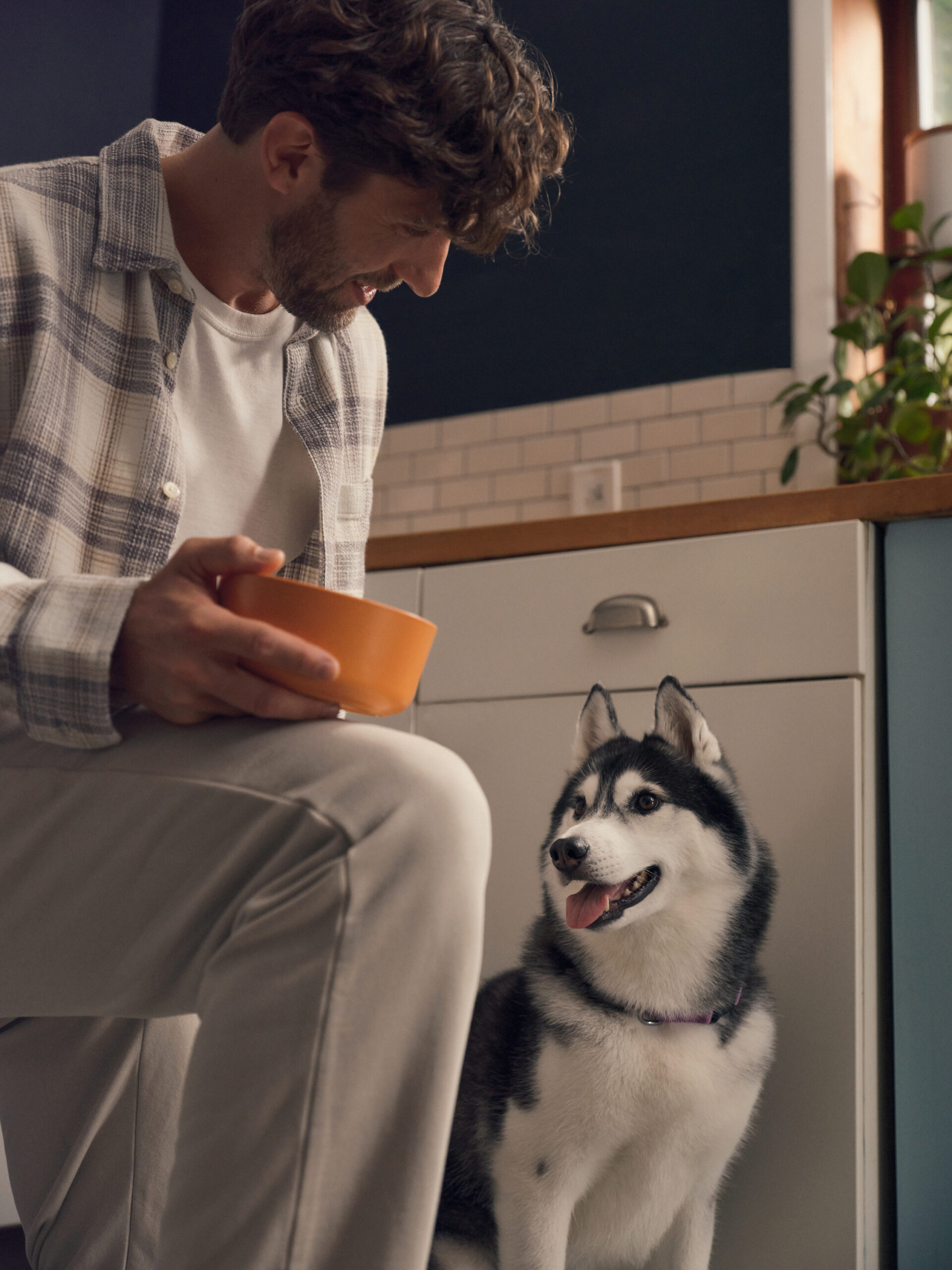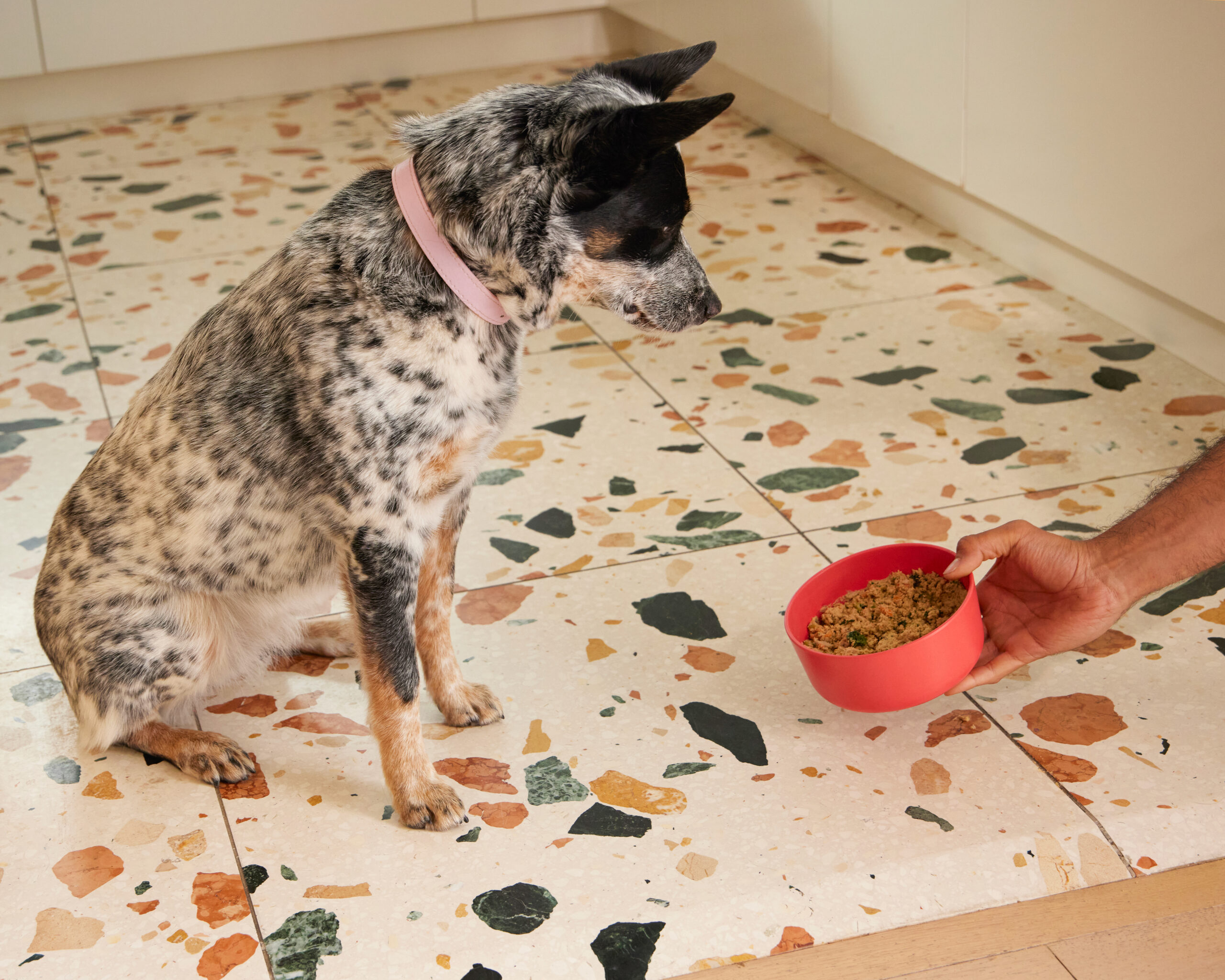Hey Ollie blog readers! We’re offering you an exclusive 60% OFF your starter box! Try now!
You’re petting your dog when you notice it, wet fur around the nose, maybe even a drip. Suddenly you’re asking yourself: “Why is my dog’s nose running?” Is this normal? Or is it something to worry about?
A runny nose in dogs, also called nasal discharge, can have a few different causes. Sometimes, it’s nothing more than a response to dust or dry air. Other times, it’s a sign of allergies, infection, or something stuck in the nasal passages. It all depends on the color, consistency, and whether your dog seems uncomfortable.
This guide will walk you through:
- What kinds of nasal discharge are normal (and what’s not)
- Common reasons your dog has a snotty nose
- How to treat a runny nose at home or with a vet’s help
- Why your dog’s diet could be quietly contributing to nasal health
And yes, what your dog eats matters. A fresh, real-food diet like Ollie fresh dog food can help reduce chronic inflammation and allergy triggers that often lead to nasal issues.
Let’s start with the basics: what a runny nose in dogs actually looks like, and how to tell if it’s something more than just “a wet nose.”
What Counts as a Runny Nose in Dogs?
Let’s clear something up: a wet nose doesn’t always mean your dog has a runny nose.
Most dogs naturally have moist noses. It helps them regulate body temperature and even enhances their sense of smell. But there’s a difference between a nose that’s damp and one that’s dripping.
A runny nose usually means there’s nasal discharge—fluid that’s actively leaking or crusting around your dog’s nostrils. That could be clear and watery, or it could look like:
- Thick snot
- Sticky mucus
- Crusty “boogers”
- Yellow or green discharge
- Blood-streaked fluid
Sometimes it’s coming from one side of the nose (a possible clue), or both. It might be constant, or it might show up only after play or naps.
If you’re wiping your dog’s nose more than once a day, or seeing anything other than a light, clear film, it’s probably time to pay attention.
Causes of Nasal Discharge in Dogs (From Minor to Serious)
Not all runny noses are created equal. Some are harmless. Others point to something more serious. Let’s break down the most common reasons your dog has a snotty nose, starting with the mildest.
Allergies
Dogs can be sensitive to pollen, dust, mold, or even ingredients in their food. Nasal discharge from allergies is usually clear and watery, often paired with:
- Sneezing
- Itchy eyes or skin
- Reverse sneezing or sniffles
Food sensitivities can trigger chronic runny noses in some dogs. That’s why switching to a limited-ingredient, fresh diet like Ollie can help reduce irritation from the inside out.
Upper Respiratory Infections
Kennel cough, canine flu, or even a simple cold can lead to thick nasal discharge, often yellow, green, or cloudy.
Symptoms may include:
- Wet sneezing
- Coughing
- Loss of energy
- Eye discharge
These infections spread easily, especially in daycares or shelters, and usually need vet care.
Foreign Object in the Nose
If your dog’s nose is dripping from one side only, especially after a walk or outdoor play, something could be stuck in there, like a seed or tiny twig.
Look for:
- Sudden, repeated sneezing
- One-sided discharge (often with blood)
- Nose pawing or rubbing
Don’t try to remove anything at home. A vet will need to take a look safely.
Nasal Mites
These microscopic parasites irritate the inside of the nose. They’re more common than you’d think, especially in social dogs.
Symptoms:
- Constant sneezing
- Bloody or thick nasal discharge
- Nose rubbing
- Snorting or “reverse sneezing”
Treatment usually involves a vet-prescribed antiparasitic medication.
Dental Problems
Infected or rotting teeth—especially upper molars, can cause nasal discharge when infection tracks upward into the sinuses.
Signs include:
- Bad breath
- One-sided nasal discharge
- Mouth pain or chewing changes
Dental health matters for more than just fresh breath. (Ollie soft, whole-food meals are also easier on sensitive mouths.)
Polyps or Tumors
Chronic nasal discharge that won’t go away, even after treatment, could be a growth in the nasal passages. It’s more common in older dogs.
Look for:
- Ongoing congestion
- Bloody or thick discharge
- Noisy breathing
- Facial swelling or asymmetry (in later stages)
This requires imaging (like a CT scan) and veterinary guidance.
Other Symptoms That May Show Up With a Runny Nose
A runny nose in dogs rarely shows up alone. Often, it’s part of a bigger story your dog’s body is trying to tell.
Here are common symptoms that may come along with nasal discharge—and what they can indicate:
Sneezing or Reverse Sneezing
- Common with allergies, nasal mites, or irritants
- Frequent, repetitive sneezing may mean something is lodged in the nose
- Reverse sneezing (that snorting, honking noise) is usually harmless but may increase with nasal inflammation
Eye Discharge or Redness
- Often seen with infections, allergies, or blocked tear ducts
- Can suggest that more than one part of your dog’s face is affected
Lethargy or Loss of Appetite
- Signs that your dog may be fighting off an infection
- If your normally food-obsessed pup is ignoring their bowl, take it seriously
- Dogs feeling unwell often seek out quiet corners or skip playtime
Fever or Warm Nose
- May point to a bacterial or viral infection
- Can come with yellow/green snot and heavy breathing
Noisy or Labored Breathing
- Includes wheezing, snorting, or breathing through the mouth
- Could be due to nasal blockage, polyps, or a respiratory infection
Nose Rubbing or Face Pawing
- A big sign your dog is uncomfortable
- Often seen with nasal mites, foreign bodies, or allergic irritation
- Repeated rubbing can also cause secondary issues like skin irritation
Tip: Keep track of these symptoms in a note or phone app before your vet visit. A complete picture helps your vet make a faster, more accurate diagnosis.
When to Call the Vet (And What to Expect)
A little nose drip now and then? Probably nothing to panic about. But there are clear signs that a dog’s runny nose is more than just a mild annoyance.
Here’s when it’s smart to get your pup checked out:
Call your vet if your dog has any of these signs:
- Discharge that is yellow, green, thick, or bloody
- One-sided nasal drip, especially if it’s persistent
- Sneezing fits, especially if they’re sudden and frequent
- Lethargy, coughing, or loss of appetite
- Swelling or deformity near the nose or eyes
- Runny nose that lasts more than 2–3 days
- Bad breath (a possible sign of dental involvement)
These symptoms can point to anything from infections to foreign objects, nasal mites, or dental problems.
What your vet may do:
Depending on the symptoms, your vet might:
- Use a scope to inspect your dog’s nasal passages
- Take a nasal swab to test for bacteria or viruses
- Recommend x-rays or CT imaging if a tumor, polyp, or hidden infection is suspected
- Check your dog’s teeth and gums for hidden dental issues
- Run allergy or blood tests if inflammation is chronic or recurring
Early diagnosis helps prevent complications. If your dog has a snotty nose and it’s not improving—or is paired with other changes in behavior, don’t wait it out.
Treatment Options for Runny Noses in Dogs
There’s no one-size-fits-all fix for a runny nose in dogs. Treatment depends on what’s behind the discharge, and how serious it is. The good news? Most cases are treatable with the right care and a little patience.
Here’s how your vet might approach it:
For Allergies
- Treatment: Antihistamines, nasal sprays, omega-3 supplements, hypoallergenic diets
- At Home: Wipe off pollen/dust after walks, use an air purifier, avoid scented cleaners
- Long-Term Help: Many dog parents see improvement when switching to a fresh, limited-ingredient diet like Ollie Fresh Dog Food, which leave out common allergens like corn, soy, and artificial preservatives
For Respiratory Infections
- Treatment: Antibiotics for bacterial infections; rest and fluids for viral ones
- At Home: Keep your dog warm, hydrated, and away from other dogs until symptoms clear
- Recovery Time: 7–14 days, depending on severity
For Foreign Objects in the Nose
- Treatment: Vet removal under sedation (don’t try this at home)
- Follow-Up: Anti-inflammatories or antibiotics if irritation is present
- Prevention Tip: Check your dog’s nose and mouth after outdoor play, especially in tall grass
For Nasal Mites
- Treatment: Prescription antiparasitic medication (usually oral or topical)
- At Home: Follow all dosage instructions, even if symptoms clear quickly
- Contagious? Mildly—especially in dogs that socialize often
For Dental Issues
- Treatment: Dental cleaning, possible tooth extraction, antibiotics
- Follow-Up: Soft foods while healing
For Tumors or Polyps
- Treatment: May include imaging, biopsy, and surgical removal
- Next Steps: Work with a veterinary specialist for long-term management
- Important Note: These cases usually show up in older dogs with chronic or bloody nasal discharge
If your dog is already being treated, be consistent with medication and report any changes. A runny nose might seem minor, but it’s often the first sign your dog’s immune system is asking for help.
Safe Home Care for a Snotty Nose
If your dog has a runny nose but isn’t showing serious symptoms, you can usually help manage things at home, at least in the short term. Just make sure you’re keeping things clean and watching for any signs that things are getting worse.
Here’s what you can safely do:
1. Wipe Away Discharge Gently
- Use a soft, damp cloth or pet-safe wipe to clean around your dog’s nostrils.
- Avoid tissues with lotion or scented wipes, which can irritate sensitive skin.
- Always wipe away from the nostrils, not toward them.
2. Run a Humidifier
- Dry indoor air can make a dog’s snotty nose worse, especially in the winter.
- A cool mist humidifier near your dog’s bed can help soothe nasal passages and reduce crusting.
3. Limit Irritants
- Avoid using sprays, air fresheners, or strong cleaning products around your dog.
- If allergies are suspected, keep windows closed during peak pollen season and wipe your dog down after walks.
4. Monitor Closely
Track changes in:
- Discharge color
- Frequency of sneezing
- Energy level
- Appetite
If any of these shift or worsen, or if the runny nose lasts more than 3 days, call your vet.
Reminder: Home care is for mild cases only. If your dog has green or bloody mucus, trouble breathing, or seems “off,” don’t wait—get veterinary help.
Can Diet Affect Nasal and Immune Health?
Yes, absolutely. Your dog’s immune system is their first line of defense, not just against infections, but also against chronic issues like allergies and inflammation that can lead to a runny nose or nasal discharge.
And that immune system? It’s deeply connected to what’s in your dog’s bowl.
How Nutrition Impacts Nasal Health:
A poor-quality diet, especially one loaded with fillers, artificial preservatives, or low-grade meat by-products, can increase inflammation, trigger allergic reactions, and weaken your dog’s natural defenses.
On the flip side, whole-food nutrition gives your dog what they need to feel better and recover faster, including:
- Omega-3 fatty acids to reduce inflammation in nasal tissues
- Antioxidants (like beta-carotene and vitamin C) to support immune cells
- Digestible animal proteins for immune strength and tissue repair
- No artificial ingredients that might irritate your dog’s system
Why Ollie Can Help:
At Ollie, we make meals with:
- Real meat first, never mystery meat or by-products
- Gently cooked veggies like spinach and carrots that naturally contain immune-boosting nutrients
- No fillers, no artificial preservatives, and no soy, corn, or wheat
We’ve seen countless dogs thrive after switching to our fresh, minimally processed meals, especially those dealing with skin and environmental allergies (which often show up as runny noses, itchy paws, or ear issues).
Supporting your dog’s health isn’t just about treatment. It’s about giving their body the tools to prevent problems in the first place, starting with their food.
FAQs About Dog Runny Noses
Is it normal for dogs to have a wet nose?
Yes, a cool, moist nose is totally normal for most dogs. It helps them smell better and regulate temperature. But if the moisture turns into constant dripping or thick discharge, it may be something more.
What if my dog has green or yellow snot?
That usually points to infection, bacterial or viral. If the nasal discharge is thick, colored, or smells bad, call your vet.
Can dogs get colds like humans?
Sort of. Dogs can catch viruses that act like colds, causing coughing, sneezing, and a runny nose. Most clear up on their own, but severe or lasting symptoms need treatment.
Why does my dog only have a runny nose on one side?
That could mean something’s stuck in one nostril, like a grass seed or small object. It can also be a sign of dental issues or even a growth. Get it checked if it doesn’t clear up quickly.
My dog has boogers every day—is that normal?
Occasional crusty boogers? Fine. Constant gunk, sneezing, or wetness? That’s worth asking your vet about, especially if you’ve ruled out dust or dry air as the cause.
Can food allergies cause nasal discharge in dogs?
Yes. Food sensitivities can show up as chronic nasal drip, skin itching, or ear infections. Many dogs improve after switching to a fresh, limited-ingredient diet like Ollie.
Tagged As:

The nutrition your dog needs,
the food they want.

Enjoying our articles? Subscribe our Newsletters and get new articles directly to your inbox
You might also like
2 July 2025
5 MINS READ
Upgrade Your Dog’s Bowl: The Truth About Premium Food Quality
Every pup parent wants the best for their dog, but choosing the right food for your dog can be overwhelming. With so many options, how do you know what truly makes a food “premium”? The answer lie…
by Serena
2 July 2025
5 MINS READ
Why Top Vets Recommend Premium Dog Food with Real Ingredients
A longer, healthier life starts with the right nutrition. The quality of your dog’s food can directly impact everything from energy levels to immune function. As more pet parents seek out the be…
by Serena
2 July 2025
6 MINS READ
Top Dog Food Options for Allergies That Truly Make a Difference
If your dog is constantly scratching, dealing with upset stomachs, or battling recurring ear infections, food allergies might be the culprit. Finding the right food for allergies can be a game-cha…
by Serena







